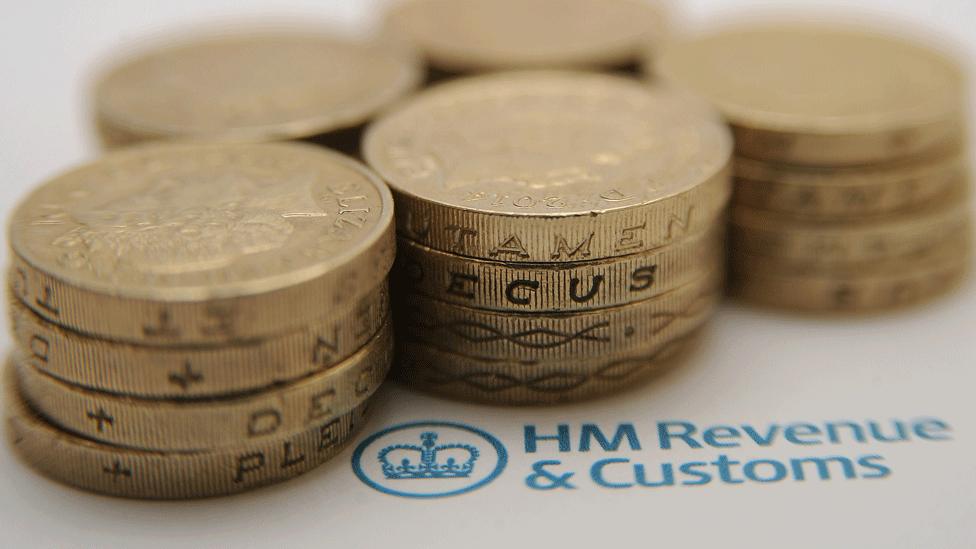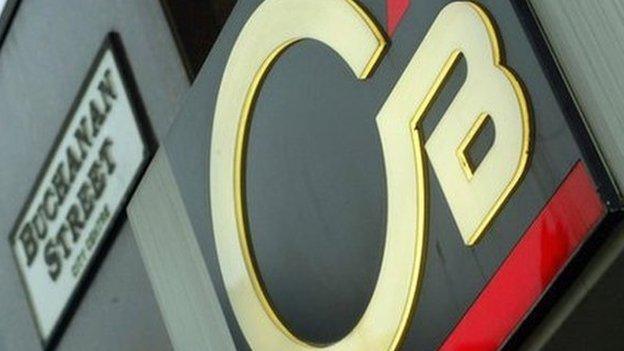Spitting tax, splitting tacks
- Published

Who wins and who loses? It's not just about seats at Westminster. The question is about the power to vary tax rates.
"Varying" could take taxes down, but we're not hearing much about that happening.
Conservatives would like to lower them over the next parliament, but don't want deeper spending cuts to make them appear even more austere than George Osborne.
A significant contribution their tax commission has made is to suggest Scotland could have another tier of income tax, between the basic and higher rate, taxing some income at, say, 30%.
Depending how it is designed, that is most likely to affect those earning in the thirty and forty thousands zone. If it is not to increase tax on some, it will only apply to a new tranche of earnings over £42,400.
Among other parties, the debate is skewed towards using the new powers to raise income tax rates - to "end austerity" or "protect public services". It is making this election campaign very different from before.
Labour is arguing that the Scottish Rate of Income Tax should go up in the 2016-17 financial year. That's this April. The legislation newly in force, for the year ahead, does not give MSPs the ability to have varied increases on different bands.
So Labour says Finance Secretary John Swinney should raise tax by 1 pence across all bands, and then hand a £100 rebate to those earning under £20,000.
Poorly targeted
It's made for some lively exchanges between the two parties. But perhaps they're... well, a bit phoney.
Both sides are right, with Labour's claim that its policy would be progressive: higher earners suffer more pain, which isn't quite what the SNP had been arguing.
The SNP is right in its counter-claim that the plan would take more tax from those of modest means: earning £20,001, where you get no rebate, still puts you about five grand under the average skilled workers' salary.
It's far from clear that Holyrood can pay a tax rebate, either legally or practically. If it can, it may be taxable - an absurd £20 tax on a tax rebate (for which perhaps there should be a rebate).
Then expert analysis by week's end showed that the rebate is a poorly targeted support for low earners.
Around a tenth of it would go to around 100,000 people living in the 20% of households with the highest total earnings (such as higher earners' spouses with part-time jobs).
But perhaps the most phoney element is political. The SNP has a Holyrood majority, and it isn't going to make such a radical amendment to the current Budget Bill - not just before an election, and least of all because Labour says it should.
Consensus
Even if Labour were to return to power after May's election, it would have to wait until next year to implement tax changes.
That's when Holyrood is on track to have more flexibility for setting bands with thresholds, setting rates and re-distributing the tax burden. No more need for that rebate.
It's clear that the SNP (though the leadership has not explicitly spelled it out yet) will have something along those lines in its manifesto too, to be implemented after the powers come in.
So it's likely that the sound and fury of recent days may turn into a broad tax-raising consensus - including Liberal Democrats, but not Tories - by the time their manifestos are published.
Coherence
That sound and fury has drowned out some of the interesting messages from two studies published on Friday by public finance experts - one from the Resolution Foundation, the other by Professor David Bell and David Eiser at the Centre for Constitutional Change.
Also worth a read is Gavin Kelly's blog, external. He is a former Downing Street adviser and Resolution Foundation director who chairs the Living Wage Commission.
Here are five observations that struck me:
If you really want to be progressive, reform council tax. MSPs could have been doing that at any time over the past 17 years.
If you think a lot more spending can be found by taxing higher earners more, think again. The Resolution Foundation says there aren't enough of them. It claims that making a big impact on spending would require the basic rate to go up.
If you want to help households with the lowest income, tax changes may not help much. Around half a million Scots workers are already below the basic rate threshold, soon to be £11,000, so they don't pay income tax at all.
This debate has so far ignored the question of how increased revenue should be spent. Government could raise around £475m from a 1 pence increase, and spend it on things that high earners tend to use more, such as university education. That's not very Robin Hood. And then, that is to ignore the other £30bn of spending. Putting the focus simply on what could be raised with new tax powers runs the risk of too little attention on the effective, efficient, targeted spending of all the rest.
Changes to welfare benefits are going to make all this very complicated. The introduction of Universal Credit means that a tax rise on lower earners in benefits will increase their entitlement to benefits, clawing back around two-thirds of the additional tax take.
The reverse is also true, so tax-cutters beware: take £1 off the tax bill of those on Universal Credit, and it reduces their benefit entitlement by 67 pence.
Plus, that UK welfare reform is itself fiercely complicated, and two benefits systems will probably have to run in parallel for some time.
As Gavin Kelly points out, this is about policy coherence. Once Scotland's politicians have got their heads around income tax, its interaction with the benefits system and with national insurance looks likely to be the next battle-front with Westminster.
- Published2 February 2016
